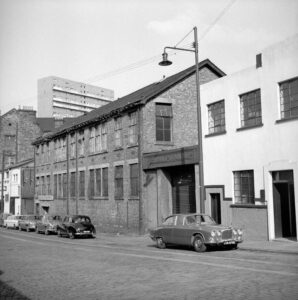
© Royal Commission on the Ancient and Historical Monuments of Scotland; SC596988. Licensor www.scran.ac.uk
Elmbank Foundry, one of the great Victorian foundries, operated in various locations but the foundry was located in Farnell Street from at least the 1930s until the business folded in 1969.
In common with the other big foundries such as the Phoenix, Saracen and the Sun, the Elmbank produced large amounts of decorative architectural ironwork, bandstands and drinking fountains.
Their architectural work was in demand across the UK, but locally they produced the stairs and balconies for JJ Burnet’s Oakbank Hospital (1914-1970) on Baird’s Brae. The foundry also produced the staircase lamps and exterior railings on Alexander ‘Greek’ Thomson’s Great Western Terrace (1866-77). These lamps are stamped with the foundry’s name and were restored as part of the realignment of the staircases in 1973.
The firm expanded and opened an office in London in the early 20th century, and their success was such that they survived into the late 1960s as one of the last of the great Glasgow foundries.
As well as their fountains, bandstands and architectural castings the company also manufactured more utilitarian products such as fire escapes and sanitary items in iron. The Urinal on the dockside of the SS Great Britain exhibition site in Bristol has been restored.
Like many other foundries, the company also produced munitions during WW1, manufactured by a mainly female workforce.

